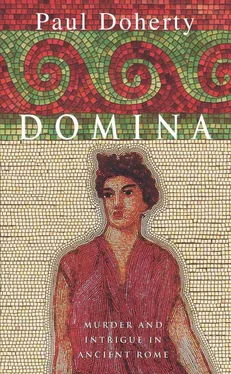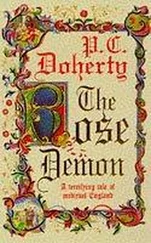Paul Doherty - Domina
Здесь есть возможность читать онлайн «Paul Doherty - Domina» весь текст электронной книги совершенно бесплатно (целиком полную версию без сокращений). В некоторых случаях можно слушать аудио, скачать через торрент в формате fb2 и присутствует краткое содержание. Год выпуска: 2012, ISBN: 2012, Издательство: Headline, Жанр: Исторический детектив, на английском языке. Описание произведения, (предисловие) а так же отзывы посетителей доступны на портале библиотеки ЛибКат.
- Название:Domina
- Автор:
- Издательство:Headline
- Жанр:
- Год:2012
- ISBN:9780755350490
- Рейтинг книги:3 / 5. Голосов: 1
-
Избранное:Добавить в избранное
- Отзывы:
-
Ваша оценка:
- 60
- 1
- 2
- 3
- 4
- 5
Domina: краткое содержание, описание и аннотация
Предлагаем к чтению аннотацию, описание, краткое содержание или предисловие (зависит от того, что написал сам автор книги «Domina»). Если вы не нашли необходимую информацию о книге — напишите в комментариях, мы постараемся отыскать её.
Domina — читать онлайн бесплатно полную книгу (весь текст) целиком
Ниже представлен текст книги, разбитый по страницам. Система сохранения места последней прочитанной страницы, позволяет с удобством читать онлайн бесплатно книгу «Domina», без необходимости каждый раз заново искать на чём Вы остановились. Поставьте закладку, и сможете в любой момент перейти на страницу, на которой закончили чтение.
Интервал:
Закладка:
It was a dangerous time! Caligula’s madness worsened by the week. He turned up at the Senate and terrified everyone by saying how marvellous Tiberius had been, how wrong they all were to criticise him. This speech marked a renewed persecution. The prisons filled. Caligula liked to visit the torture chambers, eating and drinking whilst his victims experienced a slow, agonising death. Caligula would advise the executioners to go about their work slowly so that the victim would know he was dying. Agrippina, despite her plotting, still tried to restrain him. She sent begging letters but Caligula’s only reply was:
‘Let the people hate me as long as they fear me!’
Justice was sharp and cruel. Parents had to attend the execution of their own children. One father was forced to watch his son die and then invited to dinner immediately afterwards. Caligula joked and jested throughout the meal. The owner of a school of gladiators who had displeased him was beaten to death with chains. Caligula would only allow the corpse to be removed when the stench from the putrefied body became too great. Writers were burnt alive in the arena. A Roman knight was tossed to the beasts in the amphitheatre. He ran across the sand and begged Caligula for a pardon, claiming his innocence. Furious, Caligula ordered that his tongue should be removed before he was thrown back to the waiting lions. Other more hideous punishments were perpetrated. At one infamous banquet he had the hacked limbs and bowels of a senatorial victim stacked in a steamy heap on a table so all the guests could see. Caligula broke the brooding silence with a mad fit of laughter.
‘Don’t you realise?’ he shrieked. ‘I could have all your heads with one cut!’
No one was spared. He had Caesonia, his new wife, paraded naked before guests, accusing them of treason if they looked, and demanding whether his wife disgusted them if they turned away.
By the time the summer heat reached Rome, Caligula was tired of the city. He’d grown particularly concerned by a prophecy given to Tiberius that Caligula had no more chance of becoming Emperor than of riding over the Gulf of Naples on horseback. Caligula was determined to prove this wrong. He marched his troops down to the bay and ordered his engineers to build a bridge more than three miles long from Puteoli to Baiae. Merchant ships were anchored together in a double line and a road, modelled on the Appian Way, built across them. So many ships were commandeered that the corn imports from Egypt suffered. Caligula didn’t care. He arranged for wayside taverns to be built on this makeshift road, together with resting places, even running water was supplied.
Caligula proudly proclaimed that even the God Neptune was frightened of him. The bridge was finished and Caligula had decided it was time to prove the prophecy wrong.
‘You are coming with me, sister!’ he yelled at the banquet held the night before. ‘And you, Parmenon. You’re my lucky mascot, Parmenon. Do you know that?’ His cadaverous face broke into a wolfish grin. ‘I have met him, you know,’ he whispered to me, filling my cup to the brim so the wine splashed out over my hands.
‘Who, Excellency?’ I replied.
‘Tiberius,’ he whispered. ‘He comes to my bedchamber, drenched in blood. What a hideous sight!’
‘Your Excellency, he didn’t die of wounds.’
Caligula grinned, winked and tapped the side of his nose. ‘You didn’t see what I did to his corpse afterwards,’ he replied. ‘I did enjoy myself.’
And then he turned away to bestow slobbering kisses on Caesonia. Agrippina, on the couch before me, watched this red-haired, florid-faced woman intently. My mistress reminded me of a cobra about to strike. Once we were away from the banquet she turned to me.
‘The bitch is pregnant!’ she murmured. ‘It’s time we acted!’
The following day Agrippina and I joined Caligula in a splendid chariot. The Emperor wore the breast-plate of Alexander the Great, ransacked from the Conqueror’s tomb in Alexandria. He also insisted on wearing full armour, a purple cloak trimmed with gold and adorned with jewels from India, as well as a crown of oak leaves. He then made sacrifice to Neptune and rode across his makeshift road. Backwards and forwards we went, both that day and the next, until I thought I would drop. Caligula rewarded his soldiers and invited all the onlookers onto the bridge.
The celebrations became frenetic. Many became so drunk and incapable, they fell off: corpses were washed up on the sands for weeks afterwards. Agrippina was furious, not so much with her brother’s madness, more that he might have a possible heir.
When we returned to Rome, she made a decision.
‘Caligula is to go to Germany. We must make sure he never arrives there.’ She took a bracelet off her wrist. ‘Give that to Lepidus. Tell him the die is cast!’
Chapter 9
‘The smoke and wealth and noise of Rome’
Horace, Odes: III, 29Mevania is a beauty spot a hundred miles north of Rome. Agrippina chose it as the gathering place for her fellow conspirators. A lovely setting to plot mayhem and bloodshed. The villa was cool with well-watered lawns, enclosed gardens, peristyle-shaded walks. It was some distance from the road, and Agrippina had it carefully guarded with all approaches watched. Despite my protests, the conspirators were invited and arrived one by one. Progeones, of course. Lepidus with his long head and shock of black dyed hair: a born conspirator with his twisted smile and bitter, cynical eyes. His weak, furrowed face mirrored unresolved grievances and spite. Then came a brilliant orator, a small, dapper man with flickering eyes and a surprisingly deep voice, dumpy legs and a chest like a barrel. I had heard him speak in the courts: he was brilliant. Agrippina planned to use him to turn the Senate.
Uncle Claudius should have arrived but failed to do so. Instead his representative Seneca made his first appearance in my life. Seneca, a Spaniard, looked every inch the Roman patrician and philosopher. He was of medium height and well built, with a strong, broad face, aquiline nose, and snow-white hair carefully combed forward. Seneca looked like a pompous Platonist except for the shrewd cast to his mouth and those deep-set eyes, which viewed the world with cynical amusement. Seneca had no doubts about the rightness of Agrippina’s cause. He reminded us all of Arrentius’s last words, only this time he recast them: ‘If life with Tiberius was bad enough, life with Caligula has been pure hell!’
Admittedly I was most uneasy. If you are going to form a conspiracy you must trust everyone involved. I knew little about these plotters. Time and again I broached the matter with Agrippina, but she acted as if she was possessed. She wasn’t so concerned about Caligula, more with the child that Caesonia was expecting. One evening, at the end of December, all was ready. The conspirators, or their leaders, gathered in Agrippina’s bedroom, a place of dark damascene cloths, jewelled cups, gold and silver statuettes, expensive furniture of oak, maple and terebinth, ivory-footed couches, stools and chairs made of tortoiseshell. Her large bed dominated the room. It was carved out of rare wood which reflected in its undulating grain a thousand different shades of colour, like that of the great peacock feathers adorning the wall above it.
Her son was not there. She had left him with trusted nurses in her house on the Via Sacre. We discussed how and when Caligula should die. Agrippina finally made a decision.
‘Rome would be too dangerous,’ she reasoned. ‘And when Caligula reaches Germany, he’ll be too well protected. I’ve invited him to visit me. We must do it here!’
‘By poison?’ Seneca asked.
Читать дальшеИнтервал:
Закладка:
Похожие книги на «Domina»
Представляем Вашему вниманию похожие книги на «Domina» списком для выбора. Мы отобрали схожую по названию и смыслу литературу в надежде предоставить читателям больше вариантов отыскать новые, интересные, ещё непрочитанные произведения.
Обсуждение, отзывы о книге «Domina» и просто собственные мнения читателей. Оставьте ваши комментарии, напишите, что Вы думаете о произведении, его смысле или главных героях. Укажите что конкретно понравилось, а что нет, и почему Вы так считаете.












